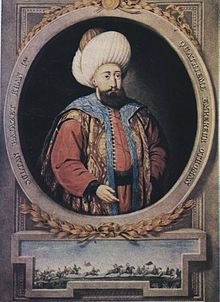Bayezit I
| Bayezid I بايزيد اول |
|||||
|---|---|---|---|---|---|
| Ottoman Sultan | |||||
 |
|||||
| 4th Ottoman Sultan | |||||
| Reign | 16 June 1389 ‒ 20 July 1402 | ||||
| Predecessor | Murad I | ||||
| Successor |
Interregnum (1402 – 1413) Mehmed I |
||||
| Born | c. 1354 | ||||
| Died | 8 March 1403 (aged 48–49) | ||||
| Burial | Bursa, Turkey | ||||
| Consorts |
Devlet Hatun Devletşah Hatun Hafsa Hatun Despina Hatun Maria Hatun Sultan Hatun Two other wives |
||||
| Issue | See below | ||||
|
|||||
| Dynasty | Ottoman | ||||
| Father | Murad I | ||||
| Mother | Gülçiçek Hatun | ||||
| Religion | Sunni Islam | ||||
| Tughra |  |
||||
| Full name | |
|---|---|
| Bayezid bin Murad |
Bayezid I (Ottoman Turkish: بايزيد اول; Turkish: I. Bayezid, Yıldırım Bayezid (nicknamed Yıldırım (Ottoman Turkish: یلدیرم), "Lightning, Thunderbolt"); 1354 – 8 March 1403) was the Ottoman Sultan from 1389 to 1402. He was the son of Murad I and Gülçiçek Hatun. He built one of the largest armies in the known world at the time and unsuccessfully besieged Constantinople. He adopted the title of Sultan-i Rûm, Rûm being an old Islamic name for the Roman Empire. He was defeated and captured by Timur at the Battle of Ankara in 1402 and died in captivity in March 1403.
The first major role of Bayezid was as governor of Kütahya, a city that was conquered from the Germiyanids. He was an impetuous soldier, earning the nickname Lightning in a battle against the Karamanids.
Bayezid ascended to the throne following the death of his father Murad I, who was killed by Serbian knight Miloš Obilić during (15 June), or immediately after (16 June), the Battle of Kosovo in 1389, by which Serbia became a vassal of the Ottoman Sultanate. Immediately after obtaining the throne, he had his younger brother strangled to avoid a plot. In 1390, Bayezid took as a wife Princess Olivera Despina, the daughter of Prince Lazar of Serbia, who also lost his life in Kosovo. Bayezid recognized Stefan Lazarević, the son of Lazar, as the new Serbian leader (later despot), with considerable autonomy.
The upper Serbia resisted the Ottomans until general Pashayigit captured the city of Skopje in 1391, converting the city to an important base of operations.
...
Wikipedia
